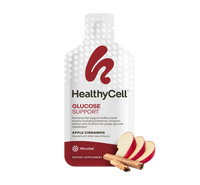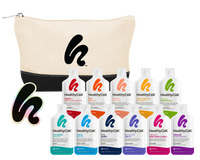According to the Academy of Nutrition and Dietetics, “appropriately planned vegetarian, including vegan, diets are healthful, nutritionally adequate, and may provide health benefits for the prevention and treatment of certain diseases.” [1]
We know that vegan diets can be perfectly adequate and even advantageous, but does that mean they always are?
Unfortunately there is no shortage of media articles telling harrowing tales about what happens when people eat vegan. There are stories of babies becoming malnourished and people suffering from nutrient deficiencies and unintentional weight loss.
Why do some people who eat vegan enjoy radiant health and others seem to have so much trouble?
Based on my experience as a vegan registered dietitian, here are the top five reasons I see vegan diets fail.
- Not eating enough food
- Not eating the right types of nutrient-rich food
- Lack of planning and preparation
- Treating eating vegan like a diet instead of a lifestyle change
- Not taking a vegan diet supplement
Fail #1: Not Eating Enough Food
One big “fail” I see people making when they go vegan is they just stop eating animal-based foods. The health benefits of vegan eating are more from the addition of lots of nutritious plant foods than from the elimination of animal foods.
Not to mention eliminating animal foods (without replacing them) takes away important nutrients including energy, protein, fat, vitamins and minerals.
This can lead to fatigue, irritability, unintentional weight loss and nutrient insufficiencies. And to that person, it could feel as if veganism failed them. Well, it wasn’t veganism. It was not eating enough food.
Fail #2: Not Eating the Right Foods
A key strategy to going vegan healthfully is to have a substitution mindset rather than an elimination mindset. Substitute animal protein foods for vegan protein foods. Substitute animal milks for calcium-fortified vegan milks. Swap all your favorite animal-based foods with the vegan versions.
For example, swapping animal proteins for vegetables or grains is going to result in a diet low in protein. In the plant world, legumes are king when it comes to protein. Vegans should eat at least three servings of legumes every day (½ cup beans, lentils, peas, tofu or tempeh; 1 serving soy-based meat; 1 cup soy milk; 2 tablespoons peanut butter).
If you relied on cow’s milk for calcium, you’ll need to find that calcium elsewhere (such as calcium-rich greens and calcium-fortified plant milk).
If you relied on fish for omega-3s, you’ll need to be diligent about eating enough omega-3-rich seeds (chia, flax and hemp) and consider taking a DHA supplement.
Similarly, eating sea life is where most people get their iodine. When you go vegan, you should think about using iodized salt if you don’t already.
To build a balanced vegan meal, use “the plate method” and fill half your plate with vegetables and/or fruit, one-quarter with grains or starches and one-quarter with protein foods.
The Plant Plate developed by vegan dietitian Virginia Messina, MPH, RD, demonstrates how to use the plate method to build nutritionally balanced vegan meals. [2]
Fail #3: Lack of Planning and Prepping
While you don’t need to spend hours in the kitchen every day to build nutritious vegan meals, you need to do a little planning and prepping to ensure you always have tasty and nutritious options on hand.
This can be especially important when traveling, attending events or going anywhere without vegan food or if you’re unsure what the vegan options will be.
People may find vegan eating to feel difficult or restrictive. To that I say, let’s veganize some of your favorite meals. Love chili? Load it up with beans. Enjoy pasta? Try legume-based noodles. Crave burgers? Try a bunch of vegan versions and see which is your favorite.
We’re lucky that there are so many vegan alternatives available today, even in “regular” grocery stores. In other words, you no longer have to seek out health food stores to get your hands on vegan products. Even Walmart and Aldi carry frozen vegan meats!
According to the Plant Based Foods Association, “the plant-based food sector grew 20% in retail sales, as compared to 2% growth for all foods.” [3] So go out and take advantage of all those plant-based offerings!
Simple strategies for vegan meal planning and prepping:
- Write down a list of meals and snacks you enjoy.
- Decide which meals and snacks you want to eat for the next week and create a grocery list with ingredients you need.
- Be sure to stock convenience foods such as canned soups and beans, pasta and marinara sauce, frozen and canned vegetables and fruit, and frozen vegan meals for extra busy days.
- Try batch cooking beans and grains.
- Utilize your freezer: Make a big a recipe, portion it out into single servings and freeze (thaw and reheat one portion at a time as needed).
- Keep tasty and filling vegan snacks in your office, bag, car and wherever else life takes you (such as nuts and dried fruit, energy bars and nut butter).
Fail #4: Treating Veganism Like a Diet Rather Than a Lifestyle
According to The Vegan Society, veganism is “a way of living which seeks to exclude, as far as is possible and practicable, all forms of exploitation of, and cruelty to, animals for food, clothing or any other purpose.” [4]
When someone with a healthy relationship with food and their body, and ample nutrition knowledge, goes vegan, they have way better odds of “success” than someone who may have a troublesome relationship with food and their body or who isn’t sure how to get the nutrients they need as a vegan.
What do I mean by a healthy relationship with food and body? I mean someone who isn’t dieting, trying to restrict calories, fat or processed food, and they have a positive body image. When folks get into veganism for ethical reasons, they’re less likely to use vegan eating as a tool for dieting or weight loss.
On the flip slide, when vegan eating is used as a diet, it can lead you down a dark and unhealthy path.
Veganism is a lifestyle based on the belief that we shouldn’t harm or use animals. It’s not a diet to be used for weight loss.
Unfortunately there is a lot of misinformation, exaggerated claims and sensationalized stories about vegan eating. It’s not true that you need to eliminate oil, salt, sugar and processed foods in order to enjoy good health as a vegan.
Be sure you’re including plenty of tasty, delicious, fun vegan foods in addition to nutrient-dense whole plant foods.
Fail #5: Not Taking Dietary Supplements
If you’re vegan, chances are you need dietary supplements. Unless you’re extremely diligent about eating enough whole and fortified plant foods (which most people aren’t).
Vitamin B12 and Vitamin D are two nutrients that most vegans require supplementation for. And there’s nothing wrong with that! There is no shame in taking dietary supplements as a vegan. It does not mean you or veganism has failed. It means you’re minding your health and covering your bases.
Depending on a variety of other factors, you may need to supplement with additional nutrients. One way to know for sure how the vegan diet is working for you is to get a vegan test for common nutrient deficiencies. Also, consider working with a registered dietitian to receive a personalized dietary assessment and recommendations.
Vegan Essentials is a highly absorbable supplement with nutrients that many vegans need!
In summary, veganism doesn’t fail. Restrictive and poorly planned diets do. To be a healthy vegan, make sure you’re putting together nutritionally balanced meals, not restricting certain vegan foods, and taking your supplements!
You May Also Like
Pros and Cons of Liquid Vitamins for Adults




